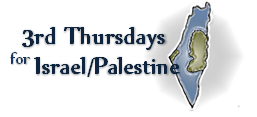 October 2017
October 2017
Urge Congress: Support Palestinian unity; end the Gaza blockade
Last week the
Palestinian Authority in the West Bank and the Hamas authorities in Gaza signed
a reconciliation deal to end the decade of division between the two groups. The
text of the agreement has not been released, but the goal of the deal, as
stated by both sides, is to reunite the West Bank and Gaza under the control of
the Palestinian Authority, while reconciling the divisions between the
political factions.
The new agreement is
an important first step toward change in Gaza and a necessary move before
larger issues between Palestinians and Israelis can be addressed.
However, this is not
the first time that the Palestinian Authority and Hamas have agreed to
reconcile, and the agreement is fragile.
In early 2006, the
National Interreligious Leadership Initiative for Peace in the Middle East set
forth principles following the
Palestinian legislative elections that continue to be important with respect to
Hamas’ participation in any Palestinian governing arrangement. They said that
Hamas must “reject violence, recognize Israel and, consistent with the
documented views of Palestinian and Israeli majorities, join the international
consensus for a two-state solution to resolve the conflict.”
This agreement comes
at a time of dire crisis in Gaza:
- Electricity is available for only one to three hours per day. Hospitals
function on generators. Students study in darkened classrooms. Families live
without the ability to use modern technology.
- The water and sanitation systems have collapsed. Up to 95 million liters
of raw sewage flows from Gaza into the Mediterranean Sea every day, and 96
percent of Gaza’s water supply is not fit for human consumption.
- The unemployment rate is over 44 percent.
- In 2012, the United Nations predicted that by 2020 Gaza would
uninhabitable, but with rapid declines in living conditions over the last
several years, some U.N. officials warn that Gaza may be unlivable even sooner.
The blockade
of Gaza has led to this current crisis, and the blockade must be lifted
regardless of what happens between the Palestinian Authority and Hamas. The
security concerns of Israel and border issues with Egypt can be addressed
through monitored crossings that allow the people of Gaza to move freely,
humanitarian aid to reach Gaza and commerce to resume.
If reconciliation
between the Palestinian Authority and Hamas is successful, it could bring
change.
The Palestinian
Authority has already indicated that it will take steps to increase its support
of Gaza, ending limits on salary payments, medical supply transfers and
payments for electricity that it put in place during the last year. Unity also
would likely result in opening the Rafah crossing between Gaza and Egypt, which
would allow more Palestinians from Gaza to travel abroad.
But many obstacles
remain that could derail the agreement. Some obstacles arise from the positions
of the parties, and both the Palestinian Authority and Hamas will need to make
hard concessions as they agree on how to share power. However, positions and
actions taken by Israel and the United States also could derail reconciliation,
and action is needed to ensure that the United States supports this important
process.
Past efforts at forming
a Palestinian unity government that would bring Hamas into the fold have
resulted in the United States threatening funding cuts and other punitive
measures against the Palestinian Authority.
Contact your
representatives today and tell them that the U.S. should offer diplomatic and
political support to this reconciliation process and should support an end to
the Gaza blockade.
For a decade,
Palestinians in Gaza have suffered as a result of disunity and the blockade.
The recent agreement presents a rare seed of hope in Gaza. Through your support,
that seed can be nourished and grown.
(To view this message in your web browser, click here.)
